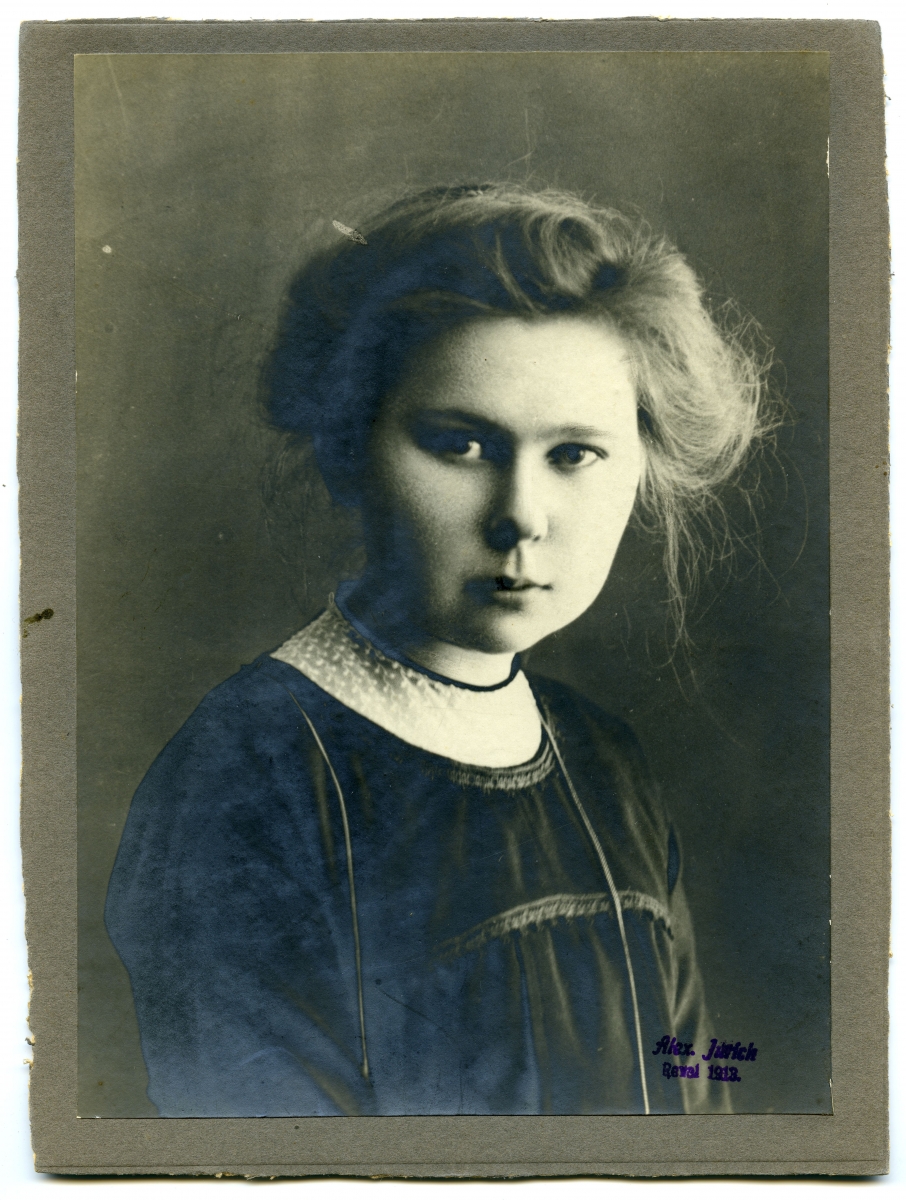
Hilda Dresen
Hilda Dresen (1896-1981) was a radio-telegraphist who learnt Esperanto in 1913. Dresen collaborated in Literatura Mondo, La Nica Literatura Revuo, Norda Prismo (1955-72), Monda Kulturo, Heroldo de Esperanto, La Praktiko [Practice], La Nova Epoko [The New Era], La Suda Stelo, Fonto and other periodicals. She translated a great deal of poetry from the Estonian, Russian, Ukrainian and German. A number of translations for Estona Antologio: I [Estonian Anth.: I] (1932) were done with her sister, Helmi (1892-1941), who was murdered by the Nazis, having become Mayoress of Tallinn (DL, p. 398). Helmi also wrote poetry.
Although Hilda Dresen dedicated herself mainly to translation, eleven of her original poems were selected for Dekdu Poetoj [Eleven Poets] (1934). Her own collection of poetry, Norda Naturo [Northern Nature], appeared in 1967. Dresen is above all a poet of nature contemplated through ’the innocent eyes of a child’. Georgi Mihalkov (q.v.) comments (BE, pp. 27, 24-5) that her poems seem to radiate the silence and tranquillity of the North. ’Dresen paints the concrete details that characterize northern nature with delicacy and emotion. … the silver birch, the bird cherry, the northern lakes.’
Mihalkov also considers Dresen to be the first Esperanto poetess to enrich the literature ’with typically female tones, motifs, emotions’ (BE, pp. 31-4). He remarks that, although Dresen’s themes are not very varied or her ’spectrum of senses’ very wide, she nevertheless succeeds in displaying the lyricalness and tender emotion of the female spirit. On the other hand, Dresen’s poetry is ruled by harmony and the outside world. She ’avoids meditation on the thoughts and feelings of the female soul’, in contrast to Marjorie Boulton (q.v.) and Eli Urbanová (q.v.). Tazio Carlevaro (q.v.) classifies Dresen’s work as being on the periphery of influence from the Budapest School of writers (cf. Kalocsay, Baghy). He considers her the first outstanding female poet in Esperanto. Dresen’s themes principally concern nature and emotional movements, which she develops with a somewhat melancholy, although never sentimental, tone (EeP, p. 148). Kálmán Kalocsay (q.v.) also commented on the melancholy in Dresen’s poetry, as did Lajos Tárkony (q.v.), although William Auld (q.v.) (PkS, p. 49) does not share the same opinion, finding her ’positive, courageous, diligent’. Auld picks out her poem ’Vento’ [Wind] as exemplifying her philosophy of life. ’… how unconventional (neŝablona) Hilda’s mind was to the end’, he wrote (PkS, p. 48).
Dresen has translated to Esperanto all important Estonian poets. Auld calculates (PkS, p. 47) some 122 poems from Estonian. Of particular note is her trans. (1975) of pts of the Estonian national epic poem Kalevipoeg (1856/61, by Friedrich Reinhold Kreutzwald), and poetry of Marie Under. Under’s Elektitaj Versaĵoj [Sel. Poems] came out in 1929, and her Sonetoj 1917 [Sonnets 1917] was published after Dresen’s death in 1988, although she had done the work in the 1930s; Under’s poems ’“Sina ütled“ I’ as ’Vi Diras: I’, rpt in NEK (1991). William Auld (PkS, p. 48) praises in particular Dresen’s translation of Juhan (Johannes) Liiv’s lyrical poetry in Al Abelujo Ĝi Flugas [To a Beehive It Flies] (1980). Dresen’s other main works on translation from Estonian are: Horizontoj [Horizons] (1931, poetry by the modern revolutionary poet Johannes Barbarus. Estonaj Kantoj [Estonian songs] (collaborator, 1931). Estona Antologio: I [Estonian Anth.: I] (ed., trans. With 16 others, 1932). Ŝippereo [Shipwreck] (1968, co-trans with H. Tulve, short story and poems by Juhan Smuul). J. Talvet (ed.): Estona Soveto Poezio [Estonian Soviet Poetry] (1977). Lumo de Orienta Eŭropo [Light of Eastern Europe] (1978, with J. Ojalo and H. Saha, the poem Ida-Euroopa valgus by Vladimir Beekmann. ’Orflava Kanto’ (rpt in BLK 1979, ’Kuldkollane laul’ by Henrik Visnapuu). Ventolume [By Wind-light] (1986, trans. With S. Kärner and J. Ojalo of poems Valik luuletusi and Tuule valgel by Debora Vaarandi). Nur Erik-floreto [Just a Little Heather Flower] (2001, coll. of poems by Enn Uibo).
Dresen collaborated in the production of Svisa Antologio [Swiss Anth.] (1939) and Versoj Elektitaj [Sel. Verse] (1965) by Russian Sergej A. Esenin.
On Dresen: in L. Totsche [Tárkony]: De Paĝo al Paĝo: Literaturaj Profiloj [From Page to Page: Lit. Profiles] (1932, rpt 1976). Á. Abonyi-Nagy: ’Norde Falis Stelo… Forpasis Hilda Dresen’ [A Star Has Fallen in the North… H.D. Has Passed Away] (1981). W. Auld: ’Ni Ne Trovos Ŝian Anstataŭanton (Nekrologo pri Hilda Dresen, 1896-1981)’ [We Won’t Find Her Replacement (Obituary for H.D.)] (1997). G. Mihalkov: ’La Naturo en Esperanto-poezio’ [Nature in Eo Poetry] (1987) and ’La Poezia Mondo de Esperanto-Poetinoj’ [The Poetic World of Female Eo Poets] (1987). B. Ragnarsson: ’Hilda Dresen Rimarkis la Nerimarkatan’ [H.D. Noticed the Unnoticed] (2006, rpt 2007.)
Source: Geoffrey Sutton. The Third Period 1931-1951. – Concise Encyclopedia of the Original Literature of Esperanto, 1887-2007. New York: Mondial, 2008, pp 193-195.



